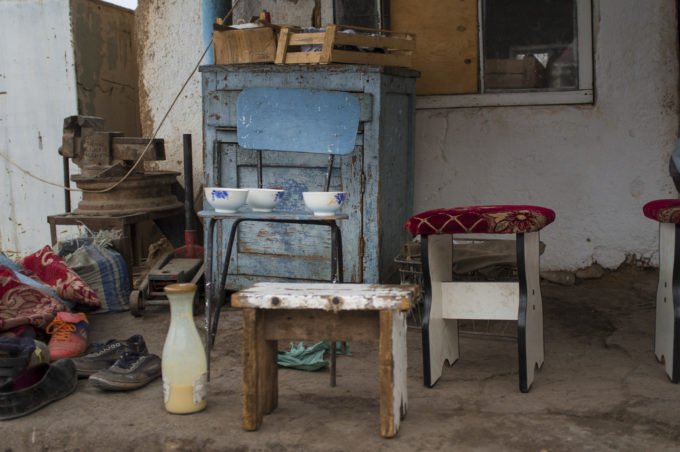
Alcohol at 8 a.m is always surprisingly pleasant

Alcohol at 8 a.m is always surprisingly pleasant
Bozo in Kyrgyzstan
It’s still dark as we leave Min-Kush, a town full of abandoned places. Defunct factories dotted with rusting machinery and derelict homes repurposed to house four-legged residents, relics of an era when it was at the heart of the Soviet Union’s nuclear program. A place so secret that it didn’t even appear on maps.
Our taxi pulls over and a passenger climbs into the front seat, bundled up against the elements in a heavy jacket and furry hat. He turns to greet us and grins, his ruddy complexion a subtle hint at his fondness for a tipple.
We encountered no restaurants in Min-Kush, only a couple of stores trading basic goods. Yesterday’s dinner comprised pasta, mayonnaise, and some lurid pink sausages; the only things we could forage from the meager rations available. I’ve high hopes for a satisfying breakfast in the next town.
“Why did you come to Min Kush?” inquired the furry-hatted passenger.
“To see another side to Kyrgyzstan,” our honest reply.
Murza, Mr. Furry-Hat, is a theater musician in Chaek, where our taxi is heading. “There are no jobs in Min-Kush, that’s why all the youngsters leave for Bishkek,” moans Murza.
Our conversation meanders, like the road on which we’re traveling, reaching the topic of alcohol. Booze seems popular in this majority Muslim country and I suggest it’s due to Russian influence. “No, not really. We have our own alcohol too.” Murza’s face lights up, like he’s about to let us in on a secret. “We have bozo! I can take you to try it. I’m only Muslim after 12 p.m. so bozo for breakfast is fine,” he chuckles.
Bozo is a centuries-old, fermented drink usually made from millet or corn. The grains of choice get boiled up and strained through a cloth. It’s drunk warm or cold and is most popular during winter. Variations of this low-alcohol drink are consumed from Central Asia to the Balkans.
We reach Chaek and follow Murza along a narrow alleyway to an inconspicuous, black metal gate with a sign handwritten in Kyrgyz taped to it. Concealed behind is a compound of three one-story houses, surrounding a large pile of coal.
A lady appears at the door to one of the houses and Murza chats to her in Kyrgyz. Seconds later she reemerges, clasping a recycled bottle of pale-yellow liquid and three bowls. The temperature makes it feel like we’re in one of those fancy ice-bars, but instead of sheepskins and sexy furniture we’re surrounded by damp laundry and discarded shoes.
Murza pours out the glossy drink and I eye the contents with suspicion. Drinking what looks like alcoholic milk at 8 a.m. seems weird. I bring the bowl to my lips and let the viscous liquid coat my mouth, its subtle fizzy tang is surprisingly pleasant. I enjoy the sensation of it sliding down my throat and a warm buzz washes over me, numbing the effects of the biting cold air.
Perched on a stool, bowl in hand, I ponder the random crossed paths that led us to this yard, in a middle-of-nowhere town in Kyrgyzstan, to drink bozo in the snow.